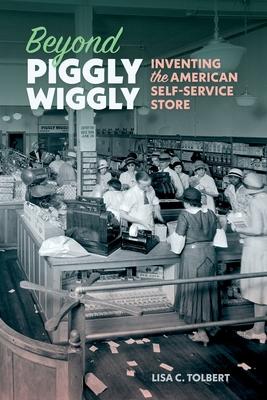Patented in 1917, Piggly Wiggly was by far the most influential self-service store of the early twentieth century. Before 1940 it was the only self-service chain with a national distribution network, but it was neither the first nor the only version. Beyond Piggly Wiggly reveals the importance of Piggly Wiggly in the invention of self-service and goes beyond the history of a single firm to explore the role of small business entrepreneurs who invented the first self-service stores in a grassroots social process.
During the 1920s and 1930s a minority of enterprising grocers experimented with a wide variety of (sometimes wacky) design ideas for automating shopping. They created specialized stores designed as enclosed retail systems that went far beyond open display techniques to construct unique physical and psychological advantages for automating salesmanship. Beyond Piggly Wiggly offers the first perspective on the national scale of experimentation and connects the southern Jim Crow origins of self- service to the national history of this mass retailing method. Empirical analysis of store arrangements demonstrates how small stores that have previously been overlooked or undervalued as quaint anomalies were integral to the creation of supermarkets. Ultimately, self-service was more than a business decision; it was a fundamentally new social practice.
Book
Beyond Piggly Wiggly: Inventing the American Self-Service Store
(Write a Review)
$34.96
Patented in 1917, Piggly Wiggly was by far the most influential self-service store of the early twentieth century. Before 1940 it was the only self-service chain with a national distribution network, but it was neither the first nor the only version. Beyond Piggly Wiggly reveals the importance of Piggly Wiggly in the invention of self-service and goes beyond the history of a single firm to explore the role of small business entrepreneurs who invented the first self-service stores in a grassroots social process.
During the 1920s and 1930s a minority of enterprising grocers experimented with a wide variety of (sometimes wacky) design ideas for automating shopping. They created specialized stores designed as enclosed retail systems that went far beyond open display techniques to construct unique physical and psychological advantages for automating salesmanship. Beyond Piggly Wiggly offers the first perspective on the national scale of experimentation and connects the southern Jim Crow origins of self- service to the national history of this mass retailing method. Empirical analysis of store arrangements demonstrates how small stores that have previously been overlooked or undervalued as quaint anomalies were integral to the creation of supermarkets. Ultimately, self-service was more than a business decision; it was a fundamentally new social practice.Paperback
$34.96